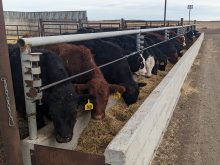Misinformation abounds about the healthfulness of canola oil
A recent email to The Western Producer warned that vegetable oil does far more harm to human health than good and that canola oil was the worst offender.
It said the “GMO oil” has been linked to muscular disorders and fatty degeneration of the heart, kidneys, adrenal and thyroid glands. The email contained no research references or any other support of the claims.
This kind of misinformation is nothing new for Shaunda Durance-Tod, CanolaInfo program manager with the Canola Council of Canada.
Her job is to promote the healthy attributes of canola oil and debunk some of the myths that are rampant on the internet.
Read Also

VIDEO: Agritechnica Day 4: Robots and more robots, Nexat loves Canada and the trouble with tariffs
Agritechnica Day 4: Robots and more robots, Nexat loves Canada and the trouble with tariffs.
“It’s hard to unravel where it’s coming from,” she said.
“I expect part of it is related to the high market share that canola oil has and that it is well accepted and used in a number of food products. People like to take aim at success, I guess.”
The biggest misconception about canola oil is that it is the same as rapeseed oil and contains high levels of erucic acid, which is toxic to certain strains of mice.
Durance-Tod said CanolaInfo conducted an advertorial campaign directed at U.S. health care professionals last year that said the defining feature of canola is that it is low in erucic acid.
Another rumour that has been making the rounds for years is that mustard gas is made from canola oil. Durance-Tod said mustard gas got its name from its mustard-like odour but is not made from mustard or any of its relatives, including canola.
“We have information on our website that is in response to some of those crazy myths that are out there,” she said.
She is perplexed how some vegetable oils, such as canola oil, are vilified on the internet while praise is heaped on others, such as coconut oil.
The U.S. Food and Drug Administration has granted canola oil a qualified health claim for its ability to reduce the risk of heart disease when used in place of saturated fat.
Clinical studies have shown that the oil, which is high in monounsaturated fat and low in saturated fat, can help lower LDL, which is the bad cholesterol in the blood, and can control blood glucose, which is helpful for people with Type 2 diabetes.
However, Durance-Tod said there is little research to support the health claims surrounding coconut oil, which is all the rage on the internet.
She said there is a “vocal misinformed” segment of the internet that seems to have a lot of sway with consumers, despite little research to back their claims. It’s the nature of the web.
“Information gets passed along and it doesn’t seem to matter whether it’s right or wrong,” said Durance-Tod.
“Consumers have a hard time because they hear this kind of stuff and they’re not sure what to believe.”
It’s why she is glad groups such as the Center for Science in the Public Interest and websites such as Snopes.com are helping dispel the myths surrounding canola oil.
Reader’s Digest columnist Dr. Dean Ornish also tackled the issue in a recent column, in which he extolled the health benefits of canola oil versus olive oil and addressed some of the myths making the rounds on the internet.
“The oil is not toxic, nor does it cause everything from heart disease to multiple sclerosis,” Ornish wrote.
“In fact, far from causing coronary artery disease, the oil is rich in heart healthy unsaturated fat — notably alpha-linolenic acid, an omega 3 fat, like that in fish oil.”
Contact sean.pratt@producer.com
















